人教版PEP小学英语五年级下册unit1至unit3知识点归纳
PEP小学英语五年级下册各单元知识重点总结
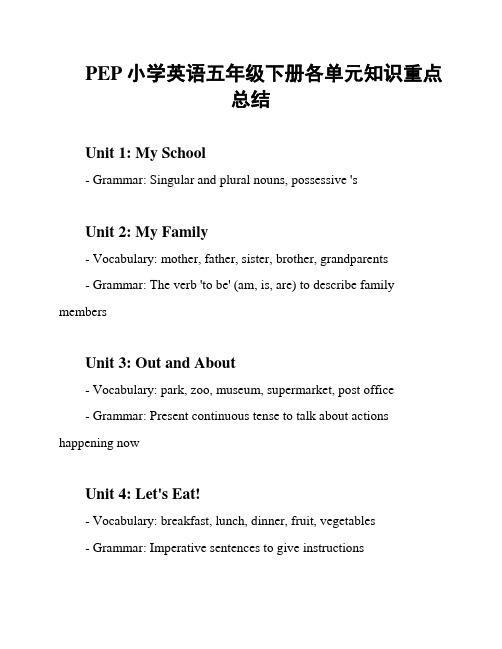
PEP小学英语五年级下册各单元知识重点总结Unit 1: My School- Grammar: Singular and plural nouns, possessive 'sUnit 2: My Family- Vocabulary: mother, father, sister, brother, grandparents- Grammar: The verb 'to be' (am, is, are) to describe family membersUnit 3: Out and About- Vocabulary: park, zoo, museum, supermarket, post office- Grammar: Present continuous tense to talk about actions happening nowUnit 4: Let's Eat!- Vocabulary: breakfast, lunch, dinner, fruit, vegetables- Grammar: Imperative sentences to give instructionsUnit 5: At the Farm- Vocabulary: farmer, barn, cow, pig, chicken- Grammar: There is/There are to talk about existenceUnit 6: Our Town- Vocabulary: street, hospital, police station, fire station, city- Grammar: Prepositions of place (in, on, under, behind, next to)Unit 7: Weather Report- Vocabulary: sunny, cloudy, rainy, snowy, windy- Grammar: Adjectives to describe weatherUnit 8: Fun with Friends- Vocabulary: play, sing, dance, swim, draw- Grammar: Simple present tense to talk about daily activitiesUnit 9: In the Ocean- Vocabulary: fish, dolphin, shark, octopus, seahorse- Grammar: Wh- questions using 'What' and 'Where'Unit 10: Happy Holidays- Vocabulary: Christmas, Easter, Halloween, New Year's Day, Thanksgiving- Grammar: Use of can for ability。
小学英语人教版PEP五年级下册1-6单元知识点总结

Unit1 My day一、基本句型1.询问什么时候做某事:- When do you ……?你什么时候……?- I usually…at …. 我通常在…(点钟)…。
例:-When do you eat breakfast?-I eat breakfast at 7:00.2.What do you do on the weekend?你周末做什么?- I +频率副词+周末活动+时间。
或Sometimes I+周末活动例句:I sometimes go shopping with my mum on the weekend.(周末我时候和妈妈一起去购物)二、知识点:1.频率副词:always(总是,一直)>usually(通常)>often(经常)>sometimes(有时)2.只有Sometimes可以放在句首。
(Sometimes I cook dinner.)3.On the weekend 在周末on Saturdays 在周六on Sundays在周日(别忘加s)Unit2 My favourite season1.-Which season do you like best? (你最喜欢哪个季节?)Why?(为什么)-I like +季节+ best.(I like spring∕summer∕fall∕winter best) Because ___________.(因为)或:-What‘s your favourite season? -My favourite season is spring∕summer∕fall∕winter.2.-Why do you like winter best?(你为什么最喜欢冬天?) -Because______.二、知识点:1.leaf(树叶):复数leaves2.W,W真神奇,问出许多大问题。
what,what,问“什么”,when,when,问“时间”,where,where,问“哪里”,which,which,“哪一个”,why,why,“为什么”.Unit3 My school calendar补充:1.Dragon Boat Festival 龙舟节或端午节(农历五月五日)一般在阳历6月2.月份首字母大写。
(完整版)pep五年级英语下册1-3单元复习重点
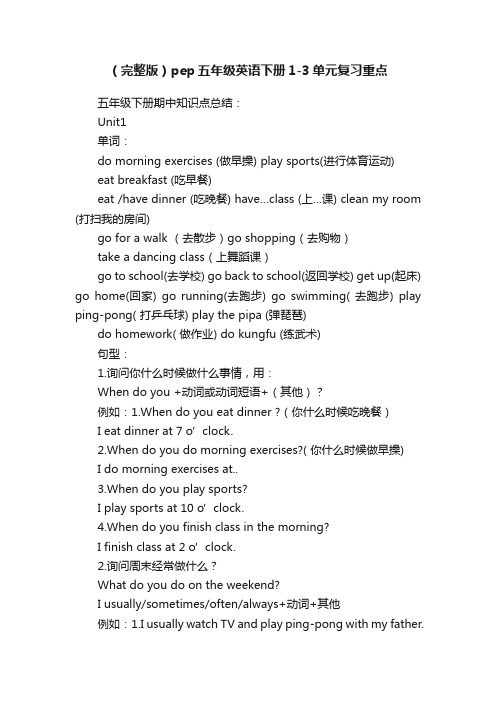
(完整版)pep五年级英语下册1-3单元复习重点五年级下册期中知识点总结:Unit1单词:do morning exercises (做早操) play sports(进行体育运动)eat breakfast (吃早餐)eat /have dinner (吃晚餐) have…class (上…课) clean my room (打扫我的房间)go for a walk (去散步)go shopping(去购物)take a dancing class(上舞蹈课)go to school(去学校) go back to school(返回学校) get up(起床) go home(回家) go running(去跑步) go swimming( 去跑步) play ping-pong( 打乒乓球) play the pipa (弹琵琶)do homework( 做作业) do kungfu (练武术)句型:1.询问你什么时候做什么事情,用:When do you +动词或动词短语+(其他)?例如:1.When do you eat dinner ?(你什么时候吃晚餐)I eat dinner at 7 o’clock.2.When do you do morning exercises?( 你什么时候做早操)I do morning exercises at..3.When do you play sports?I play sports at 10 o’clock.4.When do you finish class in the morning?I finish class at 2 o’clock.2.询问周末经常做什么?What do you do on the weekend?I usually/sometimes/often/always+动词+其他例如:1.I usually watch TV and play ping-pong with my father.( 注意和谁谁谁一起用with)2.I often go shopping.3.I usually clean my room.Unit2单词:season(季节):spring(春天summer(夏天)autumn(秋天)winter (冬天)动词短语:go on a picnic(去野餐)go swimming(去游泳)pick apples(摘苹果)make a snowman (堆雪人)play in the snow(在雪地里玩)plant flowers(种花)eat ice cream(吃冰激凌)weather(天气):warm(暖和的)windy(多风的)sunny(阳光充足的)rainy(下雨的)cold(寒冷的) cool(凉爽的)hot(热的) 特殊疑问词:what(什么)when(何时) where(哪里)which(哪一个)why(为什么)句型:1.询问最喜欢哪个季节:Which season do you like best?(你最喜欢哪个季节?)I like spring/summer/autumn/winter best!2.询问为什么喜欢某个季节Why (do you like it)? Because……例如:Why do you like summer?Because I like summer vacation. (Because 引导一个完整的句子) Why ? Because there are pretty flowers.3.询问天气情况如何What’s the weather like? It is ..Unit 3单词:January(Jan.)一月:一月一日元旦节(New Year’s Day)winter vacation(寒假)February (Feb.) 二月:winter vacation(寒假)March (Mar.) 三月:三月十二日植树节(Tree Planting Day)April(Apr.)四月:复活节聚会(Easter party)sports meet(运动会)May 五月:五月一日国际劳动节(May Day)五月的第二个星期日(Mother’s Day)sing ing contest(唱歌比赛) school trip(学校旅行)June (Jun.)六月:六月一日儿童节(Children’s Day)六月的第三个星期日是父亲节(Father’s Day)July (Jul.)七月:summer vacation(暑假)August (Aug.)八月:summer vacation(暑假)September (Sept.)九月:九月十日教师节(T eacher s’Day)Mid-Autumn Day(中秋节) October (Oct.)十月:十月一日国庆节China’s National DayNovember (Nov.)十一月:十一月第四个星期四American Thanksgiving Day(感恩节) December (Dec.)十二月:十二月二十五Christmas (圣诞节)句型:1.询问某某节日或活动是在什么时候When is +节日或活动名称?It’s in+月份。
五年级下册英语素材-unit1-3知识点归纳与延伸 人教PEP版
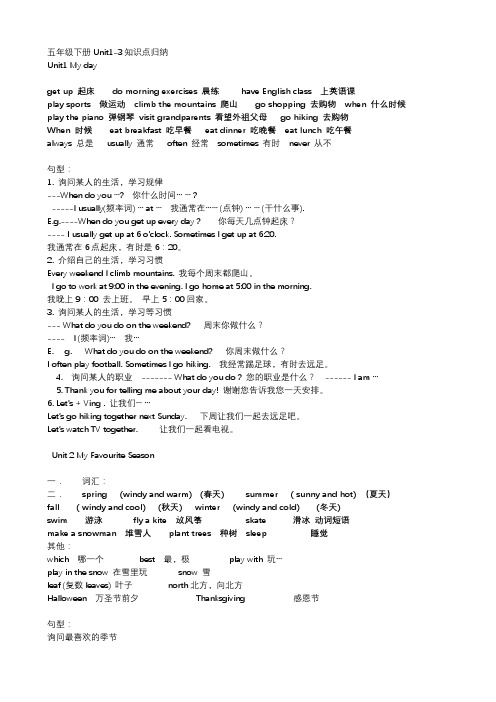
五年级下册Unit1-3知识点归纳Unit1 My dayget up 起床do morning exercises 晨练have English class 上英语课play sports 做运动climb the mountains 爬山go shopping 去购物when 什么时候play the piano 弹钢琴visit grandparents 看望外祖父母go hiking 去购物When 时候eat breakfast 吃早餐eat dinner 吃晚餐eat lunch 吃午餐always 总是usually 通常often 经常sometimes 有时never 从不句型:1. 询问某人的生活,学习规律---When do you …? 你什么时间… … ?-----I usually(频率词) … at … 我通常在…… (点钟) … … (干什么事).E.g.----When do you get up every day ? 你每天几点钟起床?---- I usually get up at 6 o’clock. Sometimes I get up at 6:20.我通常在6点起床,有时是6:20。
2. 介绍自己的生活,学习习惯Every weekend I climb mountains. 我每个周末都爬山。
I go to work at 9:00 in the evening. I go home at 5:00 in the morning.我晚上9:00 去上班。
早上5:00回家。
3. 询问某人的生活,学习等习惯--- What do you do on the weekend? 周末你做什么?---- I (频率词)… 我…E. g. What do you do on the weekend? 你周末做什么?I often play football. Sometimes I go hiking. 我经常踢足球,有时去远足。
人教版小学五年级英语下册重点知识总览
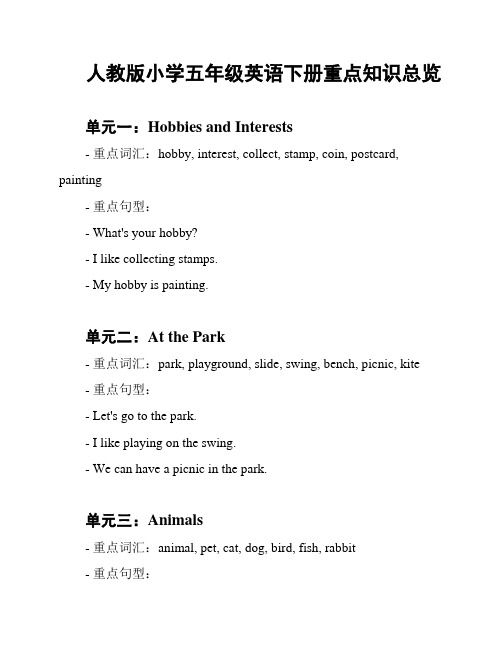
人教版小学五年级英语下册重点知识总览单元一:Hobbies and Interests- 重点词汇:hobby, interest, collect, stamp, coin, postcard, painting- 重点句型:- What's your hobby?- I like collecting stamps.- My hobby is painting.单元二:At the Park- 重点词汇:park, playground, slide, swing, bench, picnic, kite- 重点句型:- Let's go to the park.- I like playing on the swing.- We can have a picnic in the park.单元三:Animals- 重点词汇:animal, pet, cat, dog, bird, fish, rabbit- 重点句型:- Do you have any pets?- I have a pet cat.- The bird is singing.单元四:Food and Drinks- 重点词汇:food, drink, apple, banana, orange, milk, water- 重点句型:- What's your favorite food?- I like eating apples.- Can I have some water?单元五:Weather and Seasons- 重点词汇:weather, sunny, cloudy, rainy, snowy, spring, summer, autumn, winter- 重点句型:- What's the weather like today?- It's sunny and warm.- I like playing in the snow.单元六:My Family- 重点词汇:family, father, mother, brother, sister, grandfather, grandmother- 重点句型:- How many people are there in your family?- I have one brother and one sister.- My grandparents live with us.单元七:School Life- 重点词汇:school, classroom, teacher, student, desk, chair, book, pen- 重点句型:- What's your favorite subject?- I like English.- We study at school.单元八:Sports and Activities- 重点词汇:sports, activity, football, basketball, volleyball, swimming, dancing- 重点句型:- Do you like sports?- Yes, I like playing football.- Let's go swimming together.单元九:Transportation- 重点词汇:transportation, car, bus, bicycle, taxi, train, subway - 重点句型:- How do you go to school?- I go to school by bus.- I want to take a train.单元十:Occupations- 重点词汇:occupation, doctor, teacher, nurse, firefighter, policeman, musician- 重点句型:- What do you want to be in the future?- I want to be a doctor.- My mom is a teacher.以上是人教版小学五年级英语下册的重点知识总览,希望对你有帮助!。
五年级下册英语一至三单元的重点知识
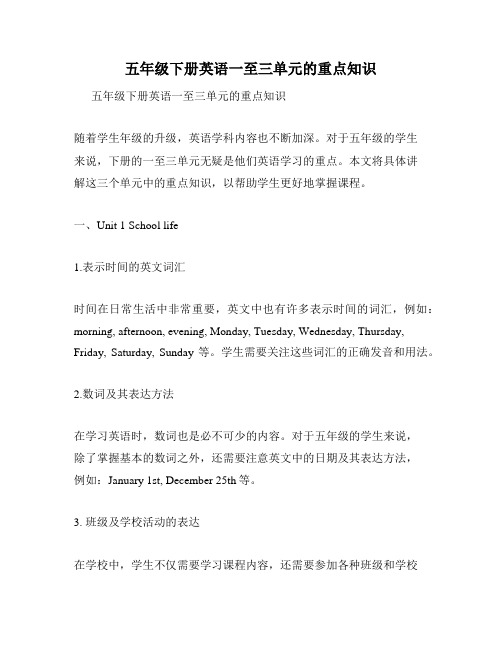
五年级下册英语一至三单元的重点知识五年级下册英语一至三单元的重点知识随着学生年级的升级,英语学科内容也不断加深。
对于五年级的学生来说,下册的一至三单元无疑是他们英语学习的重点。
本文将具体讲解这三个单元中的重点知识,以帮助学生更好地掌握课程。
一、Unit 1 School life1.表示时间的英文词汇时间在日常生活中非常重要,英文中也有许多表示时间的词汇,例如:morning, afternoon, evening, Monday, Tuesday, Wednesday, Thursday, Friday, Saturday, Sunday等。
学生需要关注这些词汇的正确发音和用法。
2.数词及其表达方法在学习英语时,数词也是必不可少的内容。
对于五年级的学生来说,除了掌握基本的数词之外,还需要注意英文中的日期及其表达方法,例如:January 1st, December 25th等。
3. 班级及学校活动的表达在学校中,学生不仅需要学习课程内容,还需要参加各种班级和学校活动。
学生需要掌握表示这些活动的常用词汇,例如:classroom, library, playground, sports day, school trip等。
二、Unit 2 Hobbies and interests1.频率副词的用法在英文中,频率副词指表示事件发生次数或频率的副词,例如:often, sometimes, always, never等。
学生需要明确这些副词的用法,并尝试在日常生活中使用它们。
2.谈论自己的爱好及兴趣在英语课上,教师会引导学生讨论自己的爱好及兴趣。
学生需要学会使用一些基本的英文表达方式,比如:I like…, I love…, My hobby is…等。
3.运动及体育活动的表达运动和体育活动是许多学生的兴趣爱好。
在英语课上,学生需要学习运动及体育活动的英文表达方式,例如:football, basketball, running, swimming, cycling等。
人教版PEP小学英语五年级下册知识点汇总(最新)
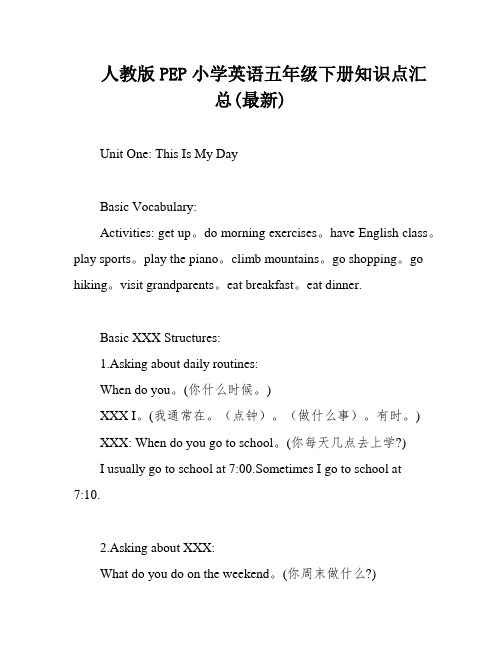
人教版PEP小学英语五年级下册知识点汇总(最新)Unit One: This Is My DayBasic Vocabulary:Activities: get up。
do morning exercises。
have English class。
play sports。
play the piano。
climb mountains。
go shopping。
go hiking。
visit grandparents。
eat breakfast。
eat dinner.Basic XXX Structures:1.Asking about daily routines:When do you。
(你什么时候。
)XXX I。
(我通常在。
(点钟)。
(做什么事)。
有时。
)XXX: When do you go to school。
(你每天几点去上学?)I usually go to school at 7:00.Sometimes I go to school at7:10.2.Asking about XXX:What do you do on the weekend。
(你周末做什么?)XXX I。
(我通常/经常。
有时。
)XXX: What do you do on the weekend?I often play XXX I go shopping with my mom.3.Introducing one's own habits:Every weekend。
I go hiking。
(我每个周末远足。
)Every day。
I do my homework at 8:00 in the evening。
(我每天晚上8点做作业。
)4.Asking XXX:What do you do。
(你是干什么的?)Time:morning。
afternoon。
evening。
noon。
at night。
6:00.on Sunday。
新人教版PEP五年级英语下册各单元知识点总结
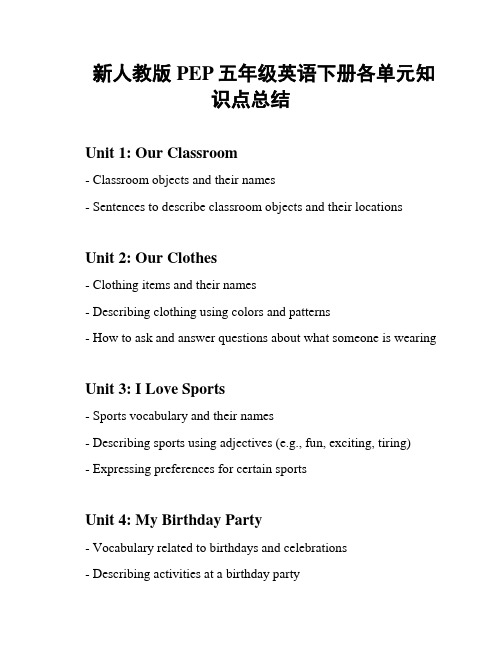
新人教版PEP五年级英语下册各单元知识点总结Unit 1: Our Classroom- Classroom objects and their names- Sentences to describe classroom objects and their locationsUnit 2: Our Clothes- Clothing items and their names- Describing clothing using colors and patterns- How to ask and answer questions about what someone is wearingUnit 3: I Love Sports- Sports vocabulary and their names- Describing sports using adjectives (e.g., fun, exciting, tiring)- Expressing preferences for certain sportsUnit 4: My Birthday Party- Vocabulary related to birthdays and celebrations- Describing activities at a birthday party- Expressing likes and dislikes about different party elementsUnit 5: At the Farm- Vocabulary related to farm animals and their names- Describing farm animals using adjectives (e.g., big, small, noisy) - Describing activities at a farm (e.g., feeding animals, milking cows)Unit 6: A Fun Day Out- Vocabulary related to amusement park rides and activities- Describing activities and experiences at an amusement park- Expressing likes and dislikes about different rides and activitiesUnit 7: A Friendly Letter- Vocabulary related to writing a letter (e.g., greeting, closing, signature)- Structure of a friendly letter- Writing a letter to a friend, describing personal experiences or activitiesUnit 8: Our Pets- Vocabulary related to pets and their names- Describing pets using adjectives (e.g., cute, friendly, playful)- Talking about responsibilities and caring for petsUnit 9: Our Earth- Vocabulary related to the environment and nature- Describing different natural elements (e.g., mountains, rivers, plants)- Expressing concerns and suggesting actions to protect the environmentUnit 10: Fun with Art- Vocabulary related to art and artistic activities- Describing different art forms (e.g., drawing, painting, sculpting) - Talking about personal preferences for different art activitiesUnit 11: Let's Travel- Vocabulary related to travel and transportation- Describing different modes of transportation (e.g., car, train, airplane)- Talking about travel experiences and preferences for different destinationsUnit 12: Healthy Habits- Vocabulary related to health and healthy habits- Describing different healthy habits (e.g., exercise, balanced diet, enough sleep)- Talking about personal choices and habits for a healthy lifestyle。
- 1、下载文档前请自行甄别文档内容的完整性,平台不提供额外的编辑、内容补充、找答案等附加服务。
- 2、"仅部分预览"的文档,不可在线预览部分如存在完整性等问题,可反馈申请退款(可完整预览的文档不适用该条件!)。
- 3、如文档侵犯您的权益,请联系客服反馈,我们会尽快为您处理(人工客服工作时间:9:00-18:30)。
五年级下册Unit 1-3重点难点、单元单词、短语和知识点知识梳理
第一单元知识点
一、主要单词:
do morni ng exercises 晨练,做早操eat breakfast 吃早饭have En glish class 上英语课play sports 进行体育活动eat dinner 吃晚饭eat lunch 吃午饭climb mountains 爬山go shopp ing 购物,买东西play the pia no 弹钢琴visit gran dpare nts 看望(外)祖父母go hik ing 去远足
二、主要句子:
When do you eat dinner? 你什么时候吃晚饭?
I eat dinner at 7:00 in the eve ning. 我晚上七点吃晚饭。
When do you get up?你什么时候起床?
I usually get up at 12:00 at noo n. 我通常在中午12 点起床。
What do you do on the weeke nd? 你在周末干什么?
Usually I watch TV and go shopp in g. 我通常看电视和购物。
Sometimes I visit my gran dpare nts. 有时候我去看望我的外祖父母。
I ofte n play football. 我经常踢足球。
Sometimes I go hiki ng. 有时候我去远足。
三、同义词
eat breakfast —have breakfast eat lu nch —have lunch
eat dinner —have dinner play sports —do sports usually —ofte n
复数形式:policema n —policeme n p olicewoma n —policewome n
现在分词:tell —telli ng
三单:say —says
同义句:What do you do ? ---What are you? 你是干什么的?
四、表示频度的副词:
always 总是,一直usually 通常,常常often 经常sometimes 有时候
五、以复数形式出现的词组:visit grandparents plant trees 介词后跟表示时间的词语时,表示在某年、某月、某个季节,某个时候(在上午,在下午,在晚上)用in ;表示在某一天,在星期几用on,在具体的几点几分用at.
七、too和either的用法区别:too和either都是“也”的意思,但too用于肯定句,either 用于否定句。
第二单元知识点
一、主要单词:
seas on 季节spri ng 春天summer夏天fall 冬天winter 冬天swim 游泳
fly kites 放风筝skate 滑冰make a snowman 堆雪人plant trees 种树
二、主要句子:
Which season do you like best? 你最喜欢哪个季节?
I like winter best. 我最喜欢冬天。
Summer is good, but fall is my favourite season 。
夏天是很好,但是冬天
是我最喜爱的季节。
Why do you like summer? 你为什么喜欢夏天?
Because I can swim in the lake. 因为我可以在湖里游泳。
Why do you like winter? 你为什么喜欢冬天?
Because I can sleep a long time. 因为我可以睡很长时间的觉。
三、同义词:autumn—fall
三单:say—says ask —asks come—comes
对应词:wake up—sleep go to bed —get up
同义句:What' s your favourite season?(你最喜爱的季节是什么?)----Which season do you like best?( 你最哪个季节?)
四、p lay with 玩雪,play in the snow 在雪中玩.如果在横线后面有the ,
则选择in , 如果在横线后面没有the , 则选择with.
五、l ike 后面不能直接跟动词。
如果需要跟动词或动词性词组时,则需在like 后面加to. 如果不加to. 就要把后面的动词变成相应的动名词形式. 如:I like to swim ===I like swimming.
六、当表示某地某个季节的天气情况时,要把季节放在前面,地点放在后面。
其结构为:What' s the weather like in 季节in 地点?
第三单元知识点
一、主要单词:January (Jan.) February (Feb.) March (Mar.) April(Apr.) May June July August(Aug.) September(Sept.) October( Oct.) November (Nov.) December ( Dec.)
二、主要句子
1. When is your birthday? 你的生日是什么时候It ' s in May. 在五月。
2. My birthday is in June. Uncle Bill ' s birthday is in June, too.
我的生日在六月。
比尔叔叔的生日也在六月。
3. Is her birthday in June? 她的生日在六月吗?Yes. 是的。
4.What' s the date? 今天是几月几日?June 9th . 六月九日。
5. What ' s the date today? 今天是几月几日?
It ' s April 10th. 四月十日。
三、主要知识点:
1、关于月份:
( 1)五月May , 六月June, 七月July ,没有简写形式。
九月September 的简写形式是前四个字母加点Sept. 其他八个月的简写形式是前三个字母加点。
( 2)无论是完全形式还是简写形式,表示12个月的单词的第一个字母都要大写。
2、关于基数词变序数词。
(1)一般情况下,直接在基数词后面加th. (one , two , three 除外)one—first , two —second , three —third .
(2)以ve 结尾的基数词,变ve 为f, 再加th. 如:five —fifth twelve
—twelfth.
⑶以t结尾的基数词,直接加h。
女口eight —eighth.
⑷以不发音的字母e结尾的,丢掉不发音的字母e,再加th.如nine —ninth.
(5)以y 结尾的整十数,在变为序数词时,将y 变为ie ,再加th. 如twenty —twentieth .
(6)20以上的两位数,变为序数词时,十位数不变,只将个位上的数变为序数
词。
女口:twenty- one----twenty-first , twenty-two —twenty-second , thirty-four —thirty-fourth .
(7)序数词的简写形式为表示该词的阿拉伯数字加上该单词的最后两个字母,最
后两个字母要变成上标格式。
如:first —1st , second —2nd , third —3rd , fourth —4th . twentieth —20th
3. 在回答When is your birthday? 这个问题时,如果只说明生日在几月份,在
月份前用in. 如My birthday is in July. 如果要具体说明生日是在几月几日,则要把in去掉,直接用is,或者在is后加on。
如My birthday is June 9th. 或My birthday is on June 9th .
4. 注意区分两个句子:What day is it today ?今天星期几?What's the date today? 今天是几月几日?
5. 根据要求写单词: make (现在分词)---making. send(现在分词)---sending.
6.句子:Howmanybirthdays are in October ?有几个人的生日在十月?There are 3.
7. My birthday is in February .(变为一般疑问句)---Is your birthday in February?
8、Does she have a computer? 她有计算机吗?当第三人称单数和句子中出现了does 时,其他动词必须使用原型。
9、读序数词时,前面一定要加the. 如October 1st . 读作October the first.
10、同义句:Whohas a birthday in October?===Whosebirthday is in October?。
